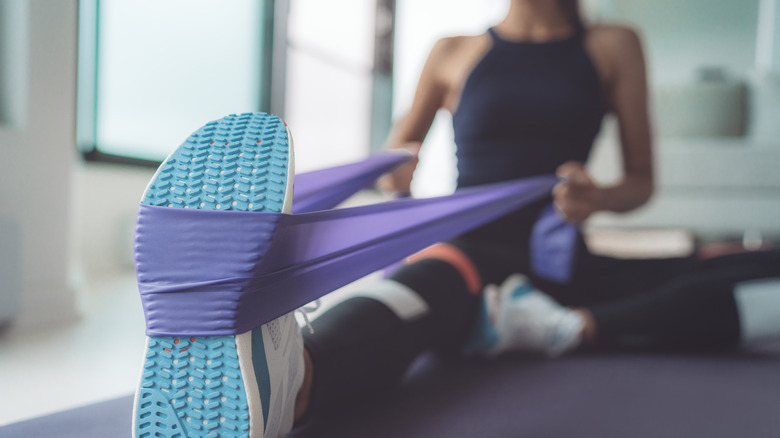Why Working Out Too Much Can Affect Your Period
Regular exercise is great for your overall health. But working out too much can interfere with your menstrual cycle and cause a condition known as amenorrhea, which is the absence of a monthly period (via Cleveland Clinic). Often associated with excessive exercise and eating disorders, amenorrhea is caused by overexertion and energy deprivation. If you're expending more energy than you consume, your body will try to conserve energy by slowing down your metabolism and halting the release of the hormones that control ovulation.
While not having a period may seem like a good thing rather than a negative side effect, amenorrhea can actually cause serious long-term health issues like osteoporosis. That's because amenorrhea significantly lowers the amount of estrogen in your body, which is needed to help maintain bone health. Over a period of time, exercising too much and not eating enough can cause your bones to become brittle and weak.
How to get your cycle back
Exercise-induced amenorrhea is not a normal part of athletic training (via Verywell Fit). It's dangerous and unhealthy, but it's also not permanent. You can recover from amenorrhea and get your cycle back by eating more and cutting back on exercise. While you can certainly regain your period by taking oral contraceptives, birth control will not address the underlying cause of your exercise-induced amenorrhea.
If you have amenorrhea from working out too much, you can get your period back by increasing your calorie intake by 10% to 15%, decreasing your training volume by up to 15%, and increasing your calcium intake. Depending on the person, this process may involve gaining weight, which can be triggering for people with eating disorders and body image issues. That's why it's important to work with a therapist, nutritionist, or doctor to help figure out the best and safest way to treat your amenorrhea and get your cycle back.
If you are struggling with an eating disorder, or know someone who is, help is available. Visit the National Eating Disorders Association website or contact NEDA's Live Helpline at 1-800-931-2237. You can also receive 24/7 Crisis Support via text (send NEDA to 741-741).


